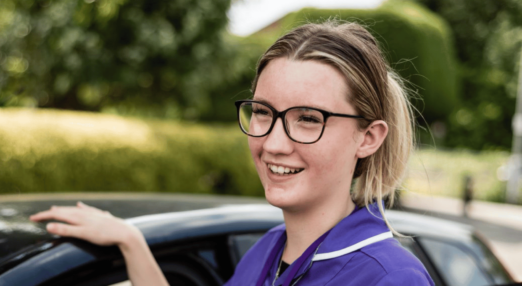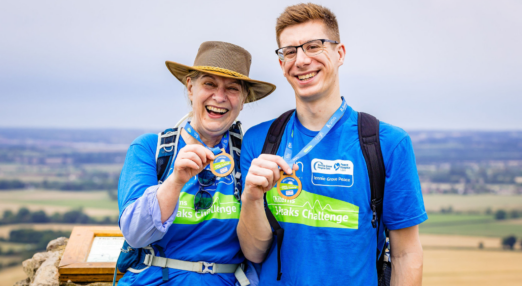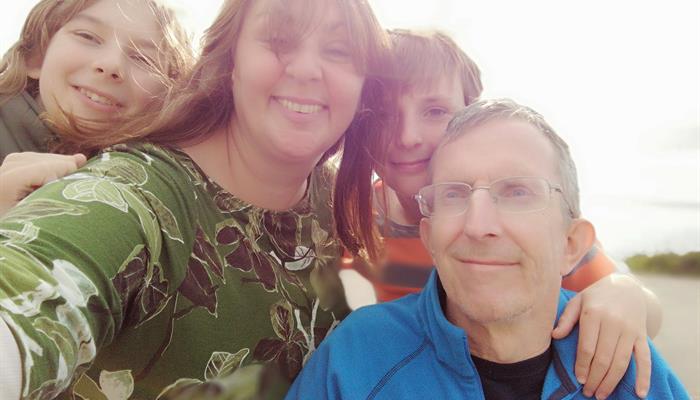Andy and his family
Andy Cox was a fit and active husband and father-of-two in his forties when he was diagnosed with the degenerative neurological condition multiple system atrophy (MSA). Rennie Grove’s nurses cared for him and his family for nearly three years, including through lockdown, until his death at aged 56, just before his twentieth wedding anniversary. His wife, Theresa, shares his story.
“Andy first realised that something wasn’t right in his 40s. He was very fit and active; a keen walker who’d climbed every Munro in Scotland, trekked the Annapurna Massif in Nepal and he had been to Everest base camp. So he realised straight away that his balance wasn’t what it should be.
“Our boys were just eight and ten when he got his diagnosis. We knew then that it was terminal – we just didn’t know how long we had. Our GP referred us to Rennie Grove’s Family Support Service so we could start having conversations about how much to tell the children and when to involve Oliver and Joseph.
“But it wasn’t until sometime in 2017 that we met Rachel. And of all the people who supported us during the seven or so years, she was the one who made most sense. The one person who seemed to know what we needed. She and her colleagues were able to give us direction when there were no sign posts. She was so direct – never brutal but always honest – where others skirted around the issue, not wanting to commit. For me, as Andy’s wife and main carer, I needed cold, hard facts to cope.
“Rachel did a brilliant job of preparing us for each stage of Andy’s illness. She would plant little seeds of what we could expect or what we might need to consider next.
“During lockdown – when every other service we’d come to rely on stopped – Rennie Grove stepped up”.
“When I first heard about hospice at home – I thought, naively, it was about cutting costs. But as Andy’s illness progressed, I realised how important it was for him to be at home, surrounded by the people and things he knew and loved, and supported by high quality, completely personalised care, over which we had more say and more control. This became more important than ever once coronavirus came along.
“During lockdown – when every other service we’d come to rely on stopped – Rennie Grove stepped up”.
“We were so careful about shielding Andy. We knew he was extremely vulnerable and that if the coronavirus were to come into our home, it would be fatal to him. Every parcel delivered spent 72 hours in ‘quarantine’; every item was sprayed and disinfected; the boys would shower and get changed as soon as they came into the house.
“Something else that was so important to Andy – and which became my driving focus in the last few weeks of his life – was that he was determined to donate his brain for research purposes... the Rennie Grove nurses knew how much it meant to Andy and therefore to me – and they went above and beyond to make sure it happened."
It was around June when Rachel quietly said to us ‘Do you think it’s time to get Andy back out into the Chilterns Hills – and to see his friends?’ We were so focused on keeping him safe that we wouldn’t have prepared properly for this final phase if Rachel hadn’t gently prompted us. Thanks to her, we were able to drive out to various viewpoints across the Chilterns for Andy to reminisce and see the hills he loved so much. And he got to say goodbye in person to everyone he wanted to see. His brother and sister spent time by his bedside in his final week, and five of his closest friends were with us when he died. We’d talked with Oliver and Joseph, also prompted and supported by Rachel, about whether they wanted to be there. They decided they would prefer to say their goodbyes and then stay away with friends. We were able to arrange all of that thanks to Rennie Grove. Rachel gave us the direction to make a personal choice and the strength to decide when they’d seen enough.
“Something else that was so important to Andy – and which became my driving focus in the last few weeks of his life – was that he was determined to donate his brain for research purposes. Complicated at the best of times, the coronavirus restrictions were making the chances of it happening slimmer by the week. The Rennie Grove nurses knew how much it meant to Andy and therefore to me – and they went above and beyond to make sure it happened.
“Last year, on 23 December, Andy was diagnosed with a chest infection. We knew this could be really serious for him and I remember him holding my hand and saying ‘I don’t want to die before Christmas’. It was the only time I’ve ever seen him look scared. But with his characteristic inner strength he beat that chest infection and rallied, until he fell ill again around Easter time, when no-one could attend funerals. ‘I don’t want to die now!’ he said to me. But he was able to plan his own funeral and 30 people could attend – though hundreds would have come had they been allowed. We plan to celebrate with everyone next year.
The Rennie Grove nurses are angels who haven’t got their wings yet – calm, straight-taking, highly skilled angels with immense experience and compassion. They helped us make sure Andy could live every last bit of his life and that his passing was peaceful and dignified and his wishes fulfilled. In spite of everything, and because of their support, I have no regrets. I don’t know what I’d have done without them.”
Where to next?
-

Community Hospice at Home
Our visiting palliative care nurses provide the choice to be cared for at home.
Read more
-

Share your story
Sharing the experience of the support you have received helps brings our work to life, inspiring our supporters and reassuring those in need of care.
Read more
-

Get involved
Donate, fundraise, volunteer or shop with us to make a difference to local families facing life-limiting illness.
Read more

